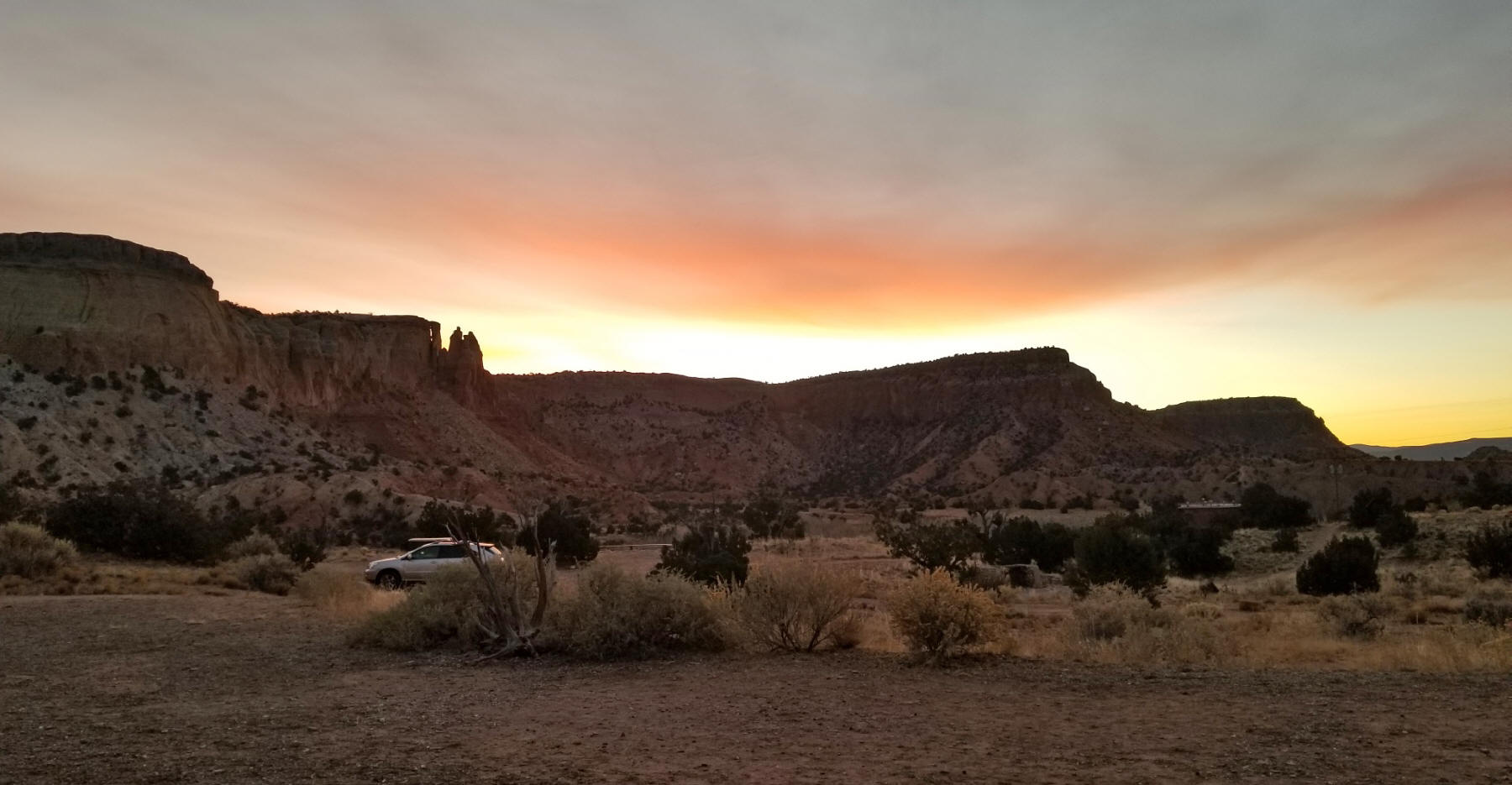Midwestern Lodging of a
Different Era
Story and photos
by Kathleen Walls
There are many hotels that reflect
a certain period of American life in the mid-west. Here are
four of my favorites. I'll bet you would love them too.
Cottage House, Council Grove,
Kansas, Westward Bound on the Santa Fe Trail
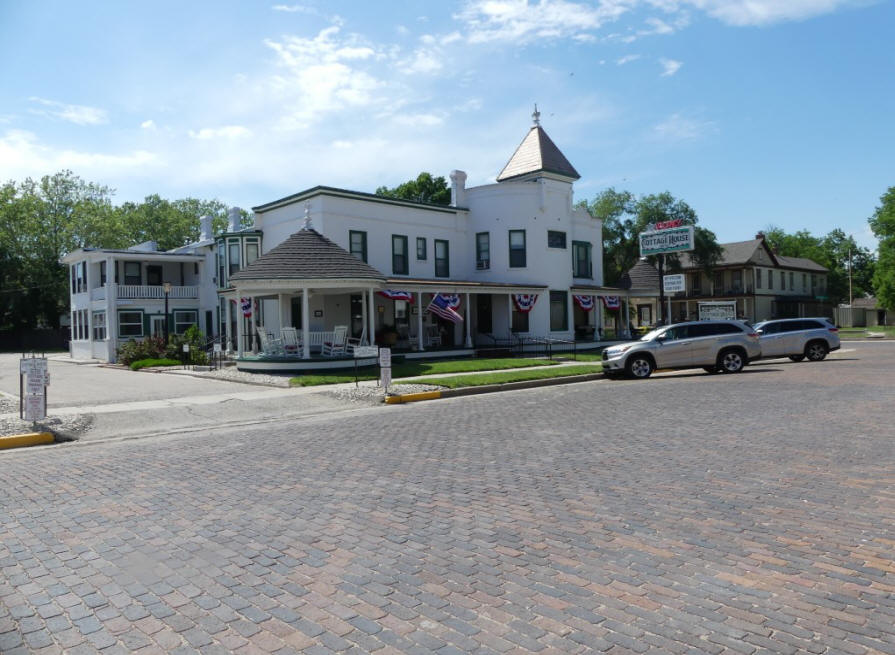
Cottage House began in 1867 as a
three-room cottage and blacksmith shop.
With travelers along
the Santa Fe Trail, Reverend Joab Spencer and his wife
bought the property. In 1871. They enclosed the existing
cottage with a two-story brick house and opened a boarding
house. The next owners, Mr. and Mrs. Lewis Mead, took things
further. In 1879 they built a large two-story Queen Anne
addition and opened as The Cottage House Hotel.
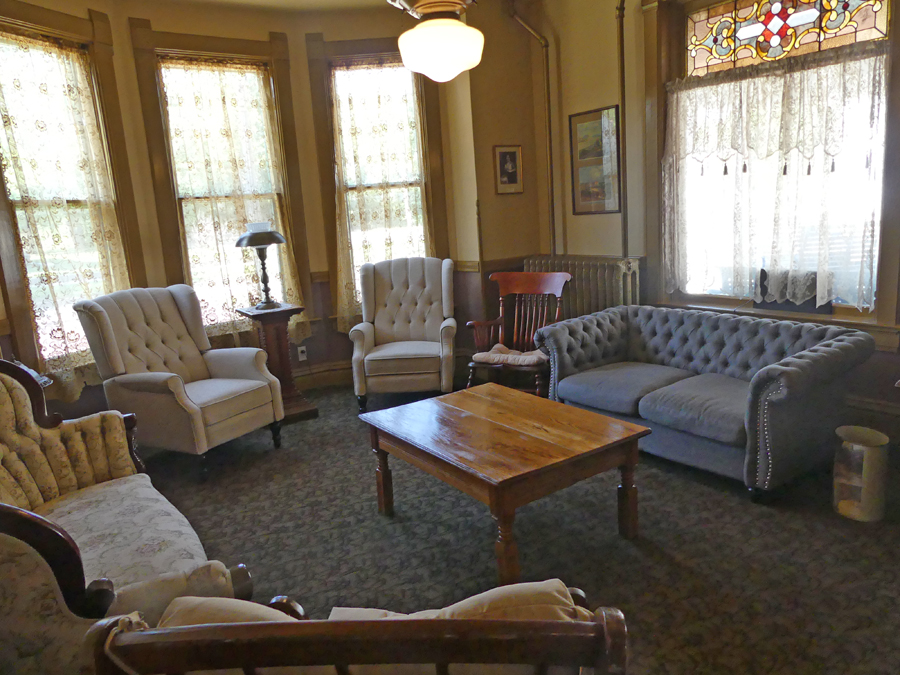
Today the Cottage House has 26
rooms in the main building, 10 rooms in their motel and two
cottages. It''s just a block off Main Street. The spacious
Victorian style porch has a gazebo providing a comfortable
place to look over historic Council Grove.
I stayed in the main
house. It felt like stepping back in time and enjoying a
comfortable historic room while keeping all the modern
conveniences like Wi-Fi.

Midland Railroad Hotel, Wilson,
Kansas, The Coming of the Railroads
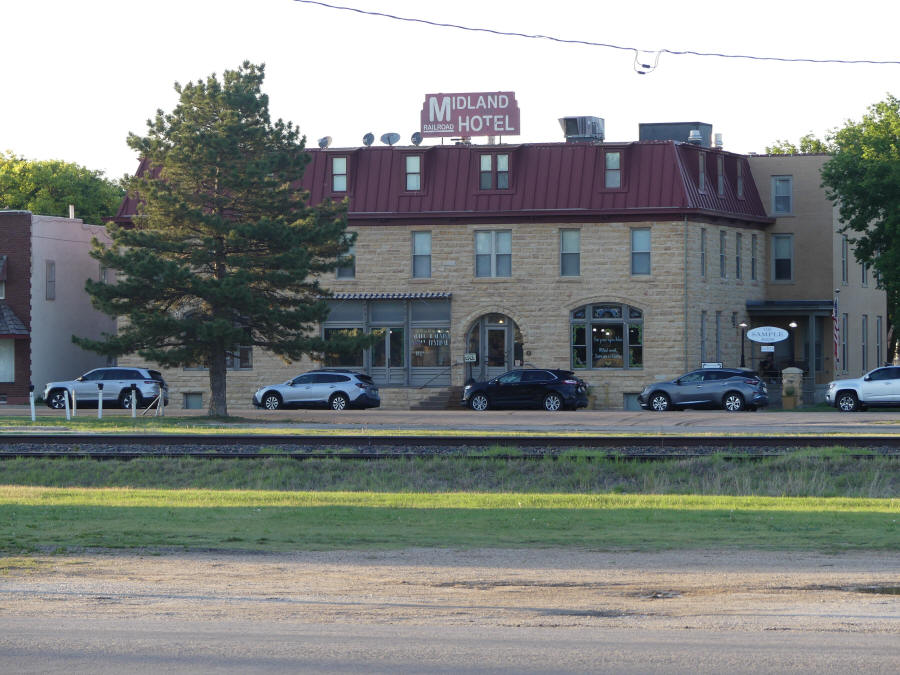
Midland Railroad Hotel
was a regular
stop off for traveling salesman in Kansas in the early 20th
century. The three-story limestone hotel, built in 1899,
along the Union Pacific Railroad route between Kansas City
and Denver. The original hotel was destroyed by a fire in
1902 but quickly rebuilt. The hotel focused on providing its
guests with a luxury experience and still does. When it was
rebuilt after the fire, it had one of only two long-distance
phone booths in Wilson. Nowdays, that''s upgraded to hotel
wide Wi-Fi plus other amenities you expect in a fine hotel.
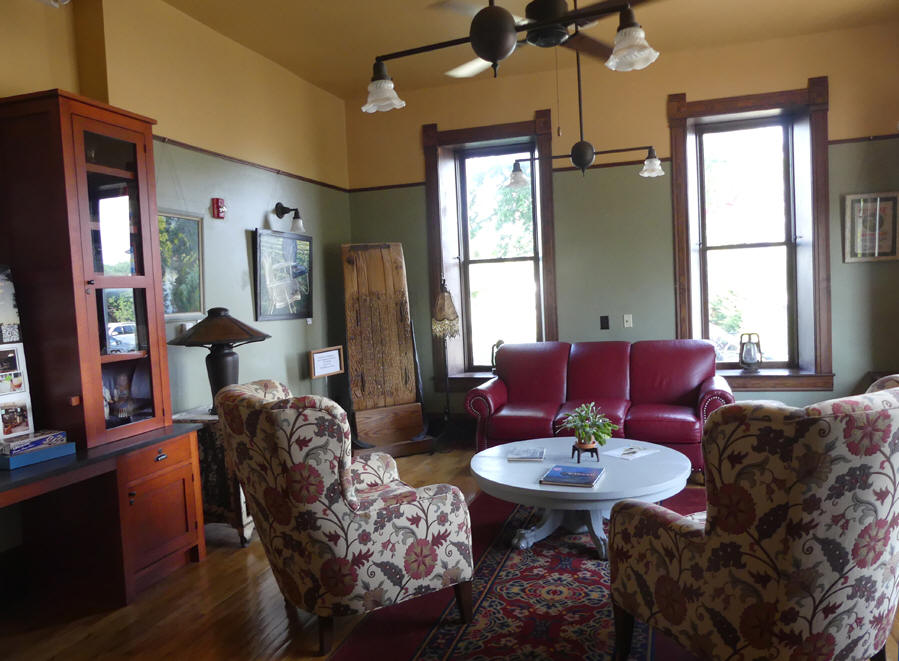
During the depression, they used the
third floor to house the chickens used to feed the guest.
The chickens who provide the eggs for your breakfast, now
reside outside behind the patio, as do some cute goats.
Their Sample Room Tavern, named because this was where
traveling salesmen would show off their wares to local
buyers, serves traditional meals.
I had chicken-fried
steak with mashed potatoes and gravy and a salad. You enjoy
a cocktail at the bar or on the outside patio.
The newly renovatd barn makes a great event venue.
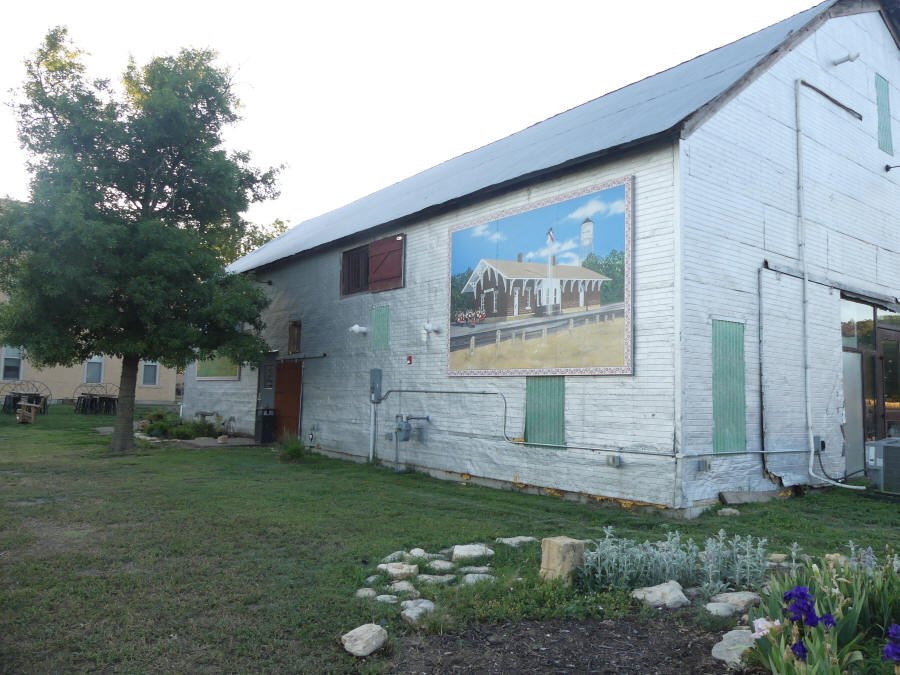
If the Midlands looks a little
familiar, it might be because you saw Paper Moon,
some of which was filmed here. Wilson is the Czech capital
of Kansas, so you''ll find plenty of Czech history here.
The Arlington Hotel, Hot Springs,
Arkansas, A Crown Jewel of the Gilded Age
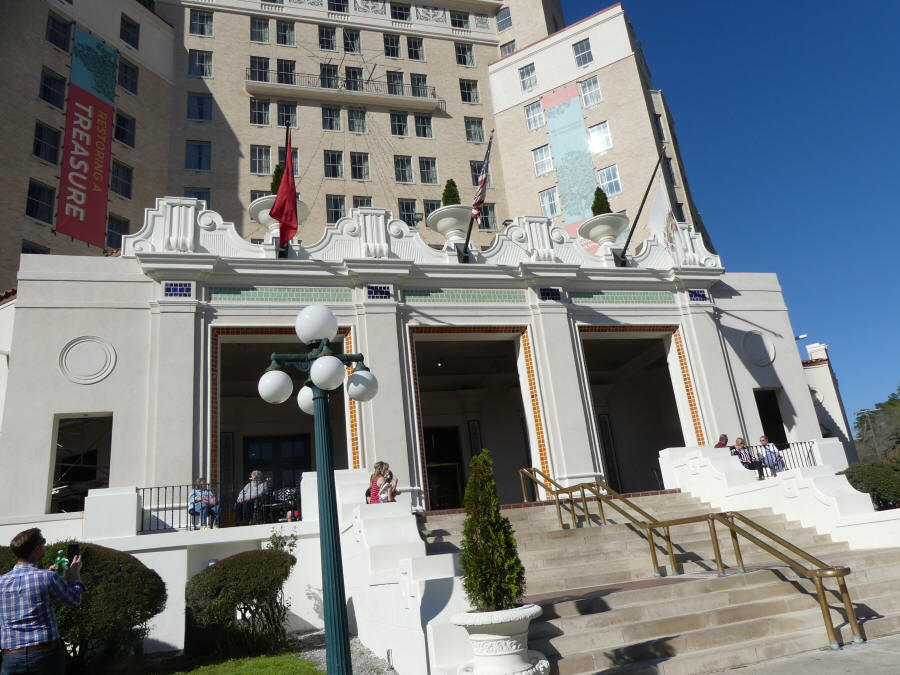
This is the third version of this
turn-of-the-century hotel. The first
Arlington that opened
in 1875, was a three story, 120 room hotel. As the hot
springs became more popular as a healing resort, the
original hotel was torn down in 1893 to make way for a
300-room Spanish Renaissance building. That didn''t survive
either. It was destroyed by fire on in 1924 and the present
Arlington opened Dec. 31, 1924. Each new version kept the
iconic twin towers.
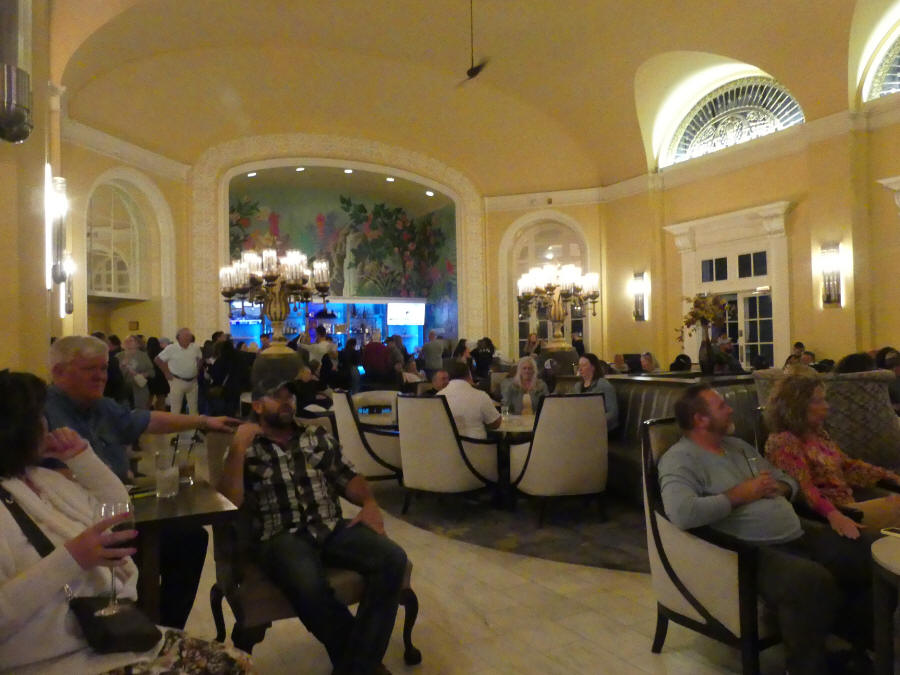
The lobby with a connected dining room
has a Victorian era look. It''s decorated with room sized
murals. Upstairs, the rooms reflect the history of the hotel
but offer many modern amenities. There''s a roof top twin
pool.
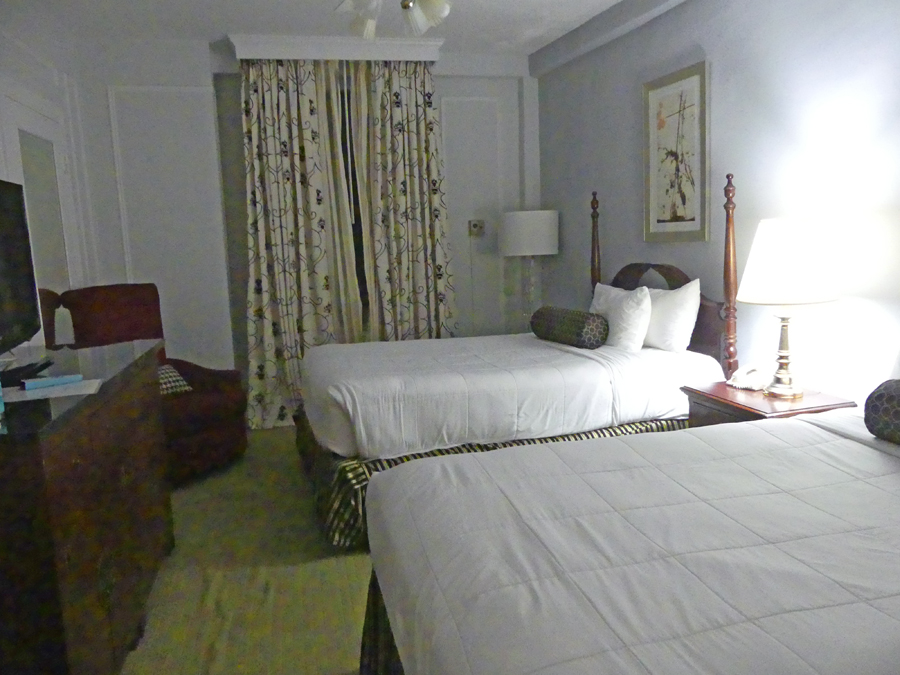
This was Al Capone''s favorite Hot
Springs hotel in the 1930s. He rented the entire fourth
floor for his staff and room 447 for himself. Today it''s the
Al Capone Suite. He wasn''t the only celebrity who stayed at
the Arlington. Babe
Ruth, Tony Bennett, Barbra Streisand and Yoko Ono. Not only
stars enjoyed the Arlington, Presidents Franklin Roosevelt,
Harry Truman, George H. W. Bush and
Bill Clinton, stayed
here and in its earlier days, William Pinkerton, head of the
Pinkerton Detective Agency, and Bat Masterson.
Rail Haven, Springfield Missouri,
The Start of Road Tripping

Back when a Model T was the height of
fashion for road trippers, it was only natural that new
highways sprang up around the country, Route 66 being the
most famous then and still a roadtrippers dream. It started
in Springfield, Missouri on April 30, 1926 when a telegram
announced it as "Route 66." John Steinbeck called it "the
Mother Road" in Grapes of Wrath. It offered a way for people
living in the small towns and cities on its route to earn a
living. They opened tourist attractions, restaurants, and
motor courts.
The motor courts were the lifeblood of the new Route 66.
Travelers needed a place to stay. A few are still alive and
flourishing.
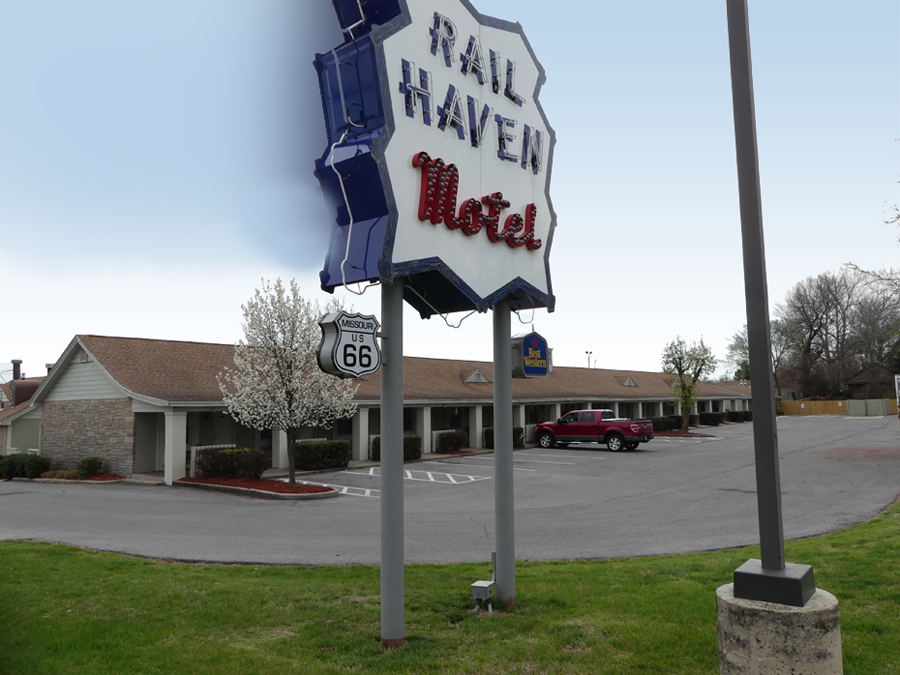
Rail Haven Motel opened in 1938, the
same year Route 66 was officially finished, with eight
sand-colored cottages.
This was the same year Civilian Conservation Corp
youth completed the last of the paving.By 1946, Rail Haven
expanded to 28 rooms, the same year Texas hotelier M.K.
Guertin formed the blanket group of independent hotels today
known as Best
Western.

Rail Haven was popular and several
celebrities stayed there. Loretta Young was one "big name"
guest but Rail Haven's most famous guest came almost
accidentally on May 17, 1956. Elvis Presley played the
Shrine Mosque that day and got into an argument with this
band after the show. Instead of staying in the same hotel
with them after that. He left the upscale Kentwood Arms and
walked down St. Louis Street where he saw the Rail Haven. He
checked in and stayed in room No. 409, now called the Elvis
Suite. Today, furnished with a pink Cadillac-themed bed and
Elvis photos.

No lodging can live on just past fame.
When I visited Rail Haven, I was impressed with the decor.
It wasn''t fancy but it fit its theme. What I saw was a motor
court of the 1960s but upgraded with modern amenities
including WIFI and quiet air conditioning. I had a
mini-fridge, a microwave, and a coffeemaker that worked for
my tea. The art on the walls showed the era from which Rail
Haven evolved. There are suites if you need more room and a
business center if you need a workspace.
****
Public Disclosure
Please Read
FTC has a law
requiring web sites to let their readers know if any of the
stories are "sponsored" or compensated. We also are to
let readers know if any of our links are ads. Most are not.
They are just a way to direct you to more information
about the article where the link is placed. We have several ads
on our pages. They are clearly marked as ads. I think
readers are smart enough to know an ad when they see one but to
obey the letter of the law, I am putting this statement here to
make sure everyone understands. American Roads and Global
Highways may contain affiliate links or ads. Further, as their
bios show, most of the feature writers are professional travel
writers. As such we are frequently invited on press trips, also
called fam trips. On these trips most of our lodging, dining,
admissions fees and often plane fare are covered by the city or
firm hosting the trip. It is an opportunity to visit places we
might not otherwise be able to visit. However, no one tells us
what to write about those places. All opinions are 100% those
of the author of that feature column.

